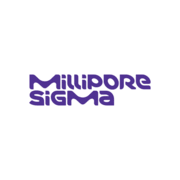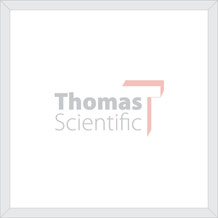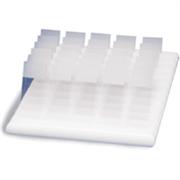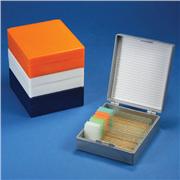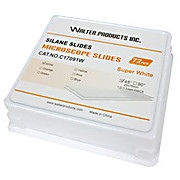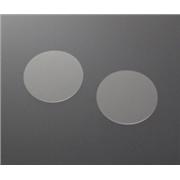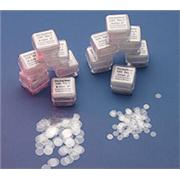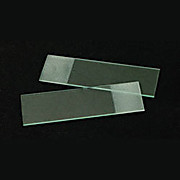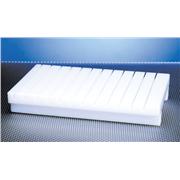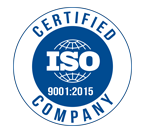Microscope Slides
Glass slides for microscopes can also be ideal for growing cells directly on the slide to create convenience when growing and viewing cells without transfer. Available in various materials, including glass, plastic, and quartz, this also includes products for preparing, staining, organizing, and transporting slides.
Slides available accommodate various uses, including geological use, petrographic studies, and thin sections.
Accessories for laboratory slides include a slide storage cabinet, microscope slide boxes, and drain racks for microscopic slides, which are ideal for keeping a clean workspace environment.
-
Prepared Microscope Slide Amphibian Set 10 slides
GSC International, Inc.Prepared Microscope Slides with specimens from amphibians. The quality glass slides have a specimen mounted in the center, with clear mounting medium and a glass coverslip. The name of the specimen is on each slide. The slides are in a plastic box with a divider to hold them in an upright…
-
STATMARK permanent marker for cassette & slide marking
MilliporeSigmaThe STATMARK Permanent ink pen in an ultra fine tip is ideal for labeling microscope slides and cassettes. Made of rigid nylon that allow for precise hand marking on glass slides as well as on most tissue embedding cassettes.
-
Immunostain Moisture Chambers
Caplugs Evergreen®Moisture chambers keep slides well isolated and maintain moisture levels for immunostaining and diagnostic reaction processes. All units are separated into ten individual compartments with space between each compartment. The closed lid ensures complete isolation by placing eight barrier…
-
Special 2 x 3 inch size (6686K20) Thickness 1.10-1.30 mm Washed, with plain edges Clinical grade Special 3 1/4 x 4 inch size (6686M20) Thickness 1.10-1.30 mm Washed, with plain cut edges Clinical grade
-
Plastic slide mailer with flip top lid. Holds 5 standard sized microscope slides (25 x 75mm or 1 x 3"). Inner slots to keep slides separate. Snap close lid secures slides. Polypropylene (PP). Available in natural and blue colors.
-
 Frosted Slides
Thermo Scientific
Frosted Slides
Thermo ScientificSuperfrost® Series Coated, indissoluble marking surface, for clearer, more readable slide labeling and more accurate slide identification 6685K45 is 1.2 mm thick.
-
15-, 40-, and 78-Capacity Slide Holders
Heathrow ScientificHold slides during evacuation, cleaning, and drying. Cut from chemical-resistant polyethylene. Solid and strong with rubber feet for benchtop stability.
-
Superfrost® Plus Gold Slides
Thermo ScientificNo need for sprays or adhesives on slide Uses glass adhesive technology For use in histology, pathology and cytology Recommended for frozen tissue samples Slides have adhesive technology which first attracts and then chemically bonds fresh or formalin fixed frozen tissue sections firmly to the…
-
Kemtech America Microscope Slides in either Super White Glass or Green Glass. Many color options available with ground or beveled edges and 45 or 90 Degree corners.
-
25-Place Slide Storage Box
Globe ScientificThese slide storage boxes are designed for the safe long term storage of microscope slides. They are produced from durable ABS plastic and offer a hinged lid for easy opening and closing. An inventory sheet is located on the inside cover for convenient slide identification and organization. The…
-
Prepared Microscope Slides
GSC International, Inc.The microscope slide sets are made of safe plastic, and are ideal for younger students. 24A00B349 This set of 10 features animals and includes the following slides: Fish Squama, Dog Hair, Pig Hair, Bird Feather, Rabbit Hair, Cow Hair, Cat Hair, Peacock Feather, …
-
Microscope Cover Slip
GSC International, Inc.These glass microscope cover slips come pre-cleaned, and are great when using microscope slides. They are 22 mm by 22 mm, 18 mm by 18 mm size #1 thickness, and come in boxes of 100 cover slips.
-
Prepared Slides
United Scientific SuppliesPrepared Slide set, 25 slides, contains: Amoeba proteus wm, Hydra wm, Earthworm cs of posterior, Daphnia and cyclops wm, housefly head with mouthparts wm, housefly leg with clinging pads, mouth smear squamous epithelium, striated muscle ls, human blood smear, bacteria smear from mouth, diatoms…
-
Silane Coated Microscope Slides
Walter ProductsThese microscope slides are made of super white glass and are silane coated, producing a sticky surface to promote adhesion of tissue sections to the slide. Slides are 25 x 75mm, 1.0-1.1mm thick, have ground edges and are pre-cleaned. Available with a white or blue frosted area for labeling.…
-
Microscope Slide Tray
DynalonProduct Dimensions (l x w x h) : 13.375x7.5x0.325in Molded of white PVC for easy distinguishing of different dyes on the slates. For storing of twenty standard slides 25 x 76 mm (1" x 3"). Designed for easy removal of slides.
-
Biology Prepared Slide Set Of 20
United Scientific SuppliesGlass prepared microscope slides, supplied in a wooden case. Contents: Allium Mitosis, ls Amoeba Proteus, wm Animal Mitosis, sec Bone, Ground Preparation, cs Desmids, wm Diatoms, Mixed, wm Euglena, wm Ficus Leaf, cs Human Blood Smear, sm Hydra - Plain and Budding, wm …
-
Round Cover Glass
Azer ScientificPure white borosilicate glass of the first hydrolytic class Excellent chemical resistance Optimal flatness Do not emit any disturbing fluorescence under the ultraviolet light of the fluorescence microscope
-
 INCYTO Disposable Slides
SKC Inc.
INCYTO Disposable Slides
SKC Inc.It provides micro-grids or micro-pillar on the slide section and enhance the view through the microscope. Features Increase productivity by eliminating cleaning and work interruptions Very light and not breakable compared with glass slides Reduces the risk of exposure to…
-
 Coverslip: #1.5 Thickness (0.17 mm or 0.0067 in.)
Harvard Apparatus
Coverslip: #1.5 Thickness (0.17 mm or 0.0067 in.)
Harvard ApparatusHigh quality coverslips glasses are essential for microscopy and imaging. Cover glasses with diameters of 5 mm and 8 mm are now available from stock in convenient packages of 100.
-
Microslide, Vinyl
RaylabconUseful for applications where slides are to be disposed Also suitable for chemical microscopy where constituents of glass might interfere. Size 3 x 1 inch; thickness 1/2 mm.
-
Bright-Line(TM) Hemacytometer
MilliporeSigmaThe Bright-Line(TM) Hemacytometer is molded from a single piece of thermal and shock-resistant glass. An H-shaped moat forms two counting areas, or plateaus. A "V" slash at the loading side of each plateau facilitates charing and reduces the possibility of overflow into the moat. Each plateau…
-
Prepared Microscope Slide Set Comparative Plant Anatomy
GSC International, Inc.A comprehensive Microscope Slide Set for studying plant anatomy. The slides hold high quality specimens with clear mounting medium and a descriptive label and are housed in a reusable slide box. The set contains the seven following slides: monocot & dicot root in comparison c.s., pine…
-
Microscope SlideTray™
SimportSlideTray™ microscope slide holder made of HIPS lasting many years even under the most adverse conditions. The SlideTray™ will hold up to 20 microscope slides in an almost horizontal position. Each slide can be easily removed and placed back in its position. The SlideTray™ is…
-
 Plastic Flat and Flip Top Slide Mailers
Globe Scientific
Plastic Flat and Flip Top Slide Mailers
Globe ScientificDesigned for safe, easy handling of microscope slides Lightweight and compact The 1, 2 and 3 place slide mailers securely hold 25 x 75mm and 1 x 3 inch slides with or without a cover glass. They feature an inner finger groove for effortless slide removal along with a cover that opens for…
-
Frosted Glass Microscope Slides
Walter ProductsFrosted glass slides are standard 1" x 3" and 1mm-1.2mm thick. This slide has one sand-blasted end used for marking and identifying. Frosted area is 19 mm long. 72 slides per box.
-
Probe Clips Press-To-Seal Incubation Chambers
Electron Microscopy SciencesFor Immunocytochemistry and In Situ Hybridization Probe Clips form a sealed chamber when pressed to a slide containing a specimen, holding reactants in place and preventing any evaporation and reactant loss. Made of a silicone gasket bonded to optically clear, hydrophobic plastic. …
-
Storage box with hinged lid for up to 100 microscope slides. Fits: 25x75mm and 1x3" slides. Cork lined for added protection. Lined inventory sheet on inside cover for easy slide identification and organization. Made from durable ABS plastic. Available in assorted colors.
-
Dip Miser, for Slide Coating
Electron Microscopy SciencesSlide coating cup with stand and cleaning brush. Glass cup is Pyrex and is designed to conserve expensive autoradiographic emulsion when coating glass slides. Needs only 1/4 the volume of solution previously required. Single piece holder permits immersion in a water bath and provides a stable…
-
Microscope Slide Blocks
DynalonMicroscope Slide Block 90 Slot (1212X52) Product Dimensions (l x w x h) : 12x7x2.25in Microscope Slide Block holds 90 slides. Made of high-density polyethylene. New improved flat design holds ninety one 1" x 3" slides (75-25mm). Block is chemically resistant, easy to clean…
-
Lab-Tek II Chambered Cover Glass
Thermo Scientific NuncSterile Leak-tested Handle for aseptic manipulations Biocompatible acrylic adhesive #1.5 Borosilicate Coverglass is configured for 1, 2, 4 and 8 well unit. Non-removable media chamber is made of proprietary cell culture grade polystyrene. Coverglass thickness is between 0.16 and…




